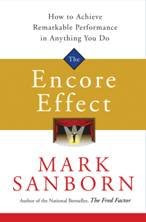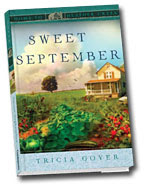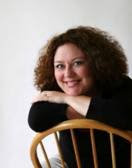
It is time to play a Wild Card! Every now and then, a book that I have chosen to read is going to pop up as a FIRST Wild Card Tour. Get dealt into the game! (Just click the button!) Wild Card Tours feature an author and his/her book's FIRST chapter!
You never know when I might play a wild card on you!
and her book:
Sunset (Sunrise Series-Baxter 3, Book 4)
Tyndale House Publishers (September 23, 2008)
Visit the author's website.
Product Details:
List Price: $13.99
Paperback: 336 pages
Publisher: Tyndale House Publishers (September 23, 2008)
Language: English
ISBN-10: 0842387587
ISBN-13: 978-0842387583
AND NOW...THE FIRST CHAPTER:
“Coming . . .” He walked from the kitchen to the front door and opened it.
“John.” Verne Pick nodded. He was a friend from church whose kids were involved with CKT, and he had a reputation for being one of the best, most thorough Realtors in Bloomington. His expression told John that he knew this was going to be a rough day. “You ready?”
He steeled himself. “I am.” He opened the heavy wooden door and welcomed the man inside. “Let’s move to the kitchen table.” John had brewed a pot of coffee, and he poured cups for both of them.
They made small talk, and after a few minutes, Verne pulled a folder from his briefcase. “We have a standard questionnaire we need to deal with first.”
John blinked, and a memory came over him. When Elizabeth died, it had taken every bit of his strength to walk through the planning of her service. But he remembered this one detail: The young woman from the funeral home who helped him with the process had presented every question couched in concern, as if she wanted to apologize for each step of the ordeal. That’s exactly how Verne was now, his brow raised as he waited for a response.
John motioned to the two closest chairs. “Let’s get the questions out of the way.”
“Okay.” Verne opened the folder and took out the document on top. He drew a long breath. “I guess we better talk about the fire first. It’s bound to come up.”
“Right. Just a minute.” John went to the next room and found a folder on the desk. He brought it back and set it on the table in front of his friend. “The garage has been completely redone, and all the repair work was signed off. Everything’s in the folder.”
“Good.” Verne lifted his chin and sniffed a few times. “No smell of smoke?”
“Not at all.”
“The place is really something.” Verne’s smile was tentative. “Should have it sold by summer, I’m guessing.”
“Yes.” A bittersweet sense of pride welled in John’s chest. “It’s a great house. Held up well through the years even with the fire.”
Verne settled in over the paperwork. “I’ve got some of this filled out already. Let’s do the basics first.” He lifted his gaze, pen poised over the top sheet. “Number of bedrooms?”
John pictured them the way they’d looked twenty years ago. He and Elizabeth in the large room at one side of the house upstairs. Brooke and Kari across from each other at the south end of the hall, Luke in the next bedroom on the left, and Ashley and Erin sharing a room at the north end. He pushed away the memory. “Five.” He took a quick sip of coffee. “Five bedrooms.”
The interview wore on, each question stirring another set of memories and reasons why he couldn’t believe he was selling the place. When they reached the end of the document, Verne bit his lower lip. “The tour comes next. I need to measure each room, get an official square footage.”
“The tour?” John looked toward the stove, and he could almost see Elizabeth standing near the kettle. “John’ll give you the tour,” she would say when company came over. “He’s so proud of the place—I like to let him do it.”
“Sure.” John gave his friend a smile. “Let’s start in the living room.”
They worked their way from one part of the house to the next, and as they went, Verne pulled out his measuring tape and captured the length of the walls.
John remained quiet. He wasn’t seeing his friend taking matter-of-fact measurements of the house he so loved. He was seeing Elizabeth, rocking their babies, Ashley learning to walk, Brooke bringing in a bird with a broken wing, and Kari screaming because she thought it might attack her. He could hear the piano, filling the house with hour after hour of not-quite-perfect songs during the years when the kids took lessons, and he could see the grandkids gathered around their tree each Christmas.
Whatever the square footage of the house, it couldn’t possibly measure what these walls had seen or the memories housed here.
They finished the final room, and Verne closed the folder. “Well, that’s about it. Just one more thing and I can get back to the office and list it.” He walked toward the front of the house. “I’ll get what I need from the car.”
John followed him into the entryway, and when he was alone, he slumped against the doorframe. For a heartbeat, he felt like he was no longer attached to his body. What was he doing, selling the house? Certainly one of his kids should’ve wanted it, right? He had six of them in the area, after all. But John had already asked each of them. Brooke and Peter liked the house they lived in because it was easy for Hayley and comfortable. “We have our own memories here,” Brooke had told him. “The Baxter place would be much too big for us.”
Kari had felt the same way about having her own memories. Ryan had designed the log house they lived in, and it had a sort of rugged lodge feel both Kari and Ryan loved.
Ashley had been a possibility at first. She had told him a number of times that she would love to raise the boys here, where she’d grown up. But she wasn’t painting enough to bring in regular money, and the mortgage on the house would be far beyond what Landon could afford, especially with their growing boys.
Once John had even considered calling Dayne, because it would’ve been nothing for him to loan Ashley and Landon the money—maybe at a lower rate or for a longer period of time.
But Ashley had begged him not to. “I don’t want Dayne to think of us like that, using him for his money.”
John could’ve argued with her, but there was no point, really. Ashley was right; the situation would have been awkward.
As for his other kids, Luke and Reagan needed to be close to Indianapolis for Luke’s job, and things were still very shaky between them. They’d found a nearby church, and John was encouraging them to get counseling at a local center. There was no way they’d be interested in moving again.
Last there were Erin and Sam. At first, when Erin called to announce that they were moving back to Indiana, John thought he had his answer, a way to keep the house in the family. But Sam worked long days, and Erin was busy with the kids. Upkeep on a house with acreage was more than they were willing to take on even for the sake of nostalgia. So they were out.
John wandered into the front room and peered through the window at Verne out front. Way down at the end of his driveway, his friend had taken a large For Sale sign from the back of his car. John’s heart swelled with frustration and futility as he watched Verne position the sign not far from the road. The Baxter house . . . for sale. John gritted his teeth and looked away. This was where he’d wanted to live out the rest of his days, so maybe he was wrong. Maybe this was all a mistake. He looked out the window again and narrowed his eyes.
No, there was no mistake in what he was doing. Living in this house into his twilight years meant sharing it with Elizabeth, and since she wasn’t here, the house could go. It had to. He and Elaine Denning were moving ahead with their plans to marry, and they needed a new place to begin their life together and—
The echo of a mallet against a stake resonated deep within him. It was barely loud enough to hear, but John knew the sound. He took a few steps closer to the window as Verne hammered the sign into the ground.
Why, God? Isn’t there some way to save the place?
In response there was only the sound of another blow, another strike of the mallet.
John winced as Verne finished the job. Yes, his years in the Baxter house were over. The time had come to move on, and with God’s help that’s what John would do. He gripped the windowsill and breathed in deeply the familiar smell of his home. He would survive letting go of this place, because he had no other choice.
Even if it all but killed him to say good-bye.
***
Ashley Baxter Blake flung open the bathroom window, braced herself against the sink, and stared at the mirror. Her hands trembled and her heart raced as she glanced at the clock on the bathroom counter—9:31 a.m. Okay, here goes. . . . She marked the second hand and stared at the mirror again. The next minute was bound to drag, and Ashley couldn’t make it go faster by watching the clock.
How could she have lied to herself for so long? She leaned closer, studying her look. Her makeup didn’t cover the dark circles under her eyes. She was dizzy and weary, drained from another morning of dry heaves, and no amount of fresh air staved off the nausea.
Through Christmas she had given herself a dozen reasons why she might be late—busyness and excitement during the holidays, running after Cole and Devin almost constantly, and the heartache of missing baby Sarah. It could take a year after losing a baby before her body found its normal routine of cycles. That’s what her doctor had told her. A year. It hadn’t been nearly that.
But she’d had just one period in the last four months, and finally Ashley had done what she thought about doing weeks ago. She bought a test, and now in less than a minute she’d know the truth. Not that she needed the test at this point. She touched her fingers gently to her abdomen. It wasn’t exactly bulging, but it was slightly rounded and firm, the way she’d always felt when she was in her first few months of pregnancy.
The difference was that every other time she had been ecstatic about maybe being pregnant, ready to rush to the drugstore for a test the moment she suspected she was a day or so late. Even in the weeks after losing Sarah, she and Landon had wanted nothing more than to try for another child. But somewhere along the journey of letting go of her daughter, Ashley had realized something deep within her.
She couldn’t lose another baby.
By God’s grace and with Landon by her side she’d survived losing Sarah, but another child? Ashley wasn’t sure she’d survive. The sound of her too fast heartbeat echoed against her temples, and she blinked at her image in the mirror. Standing here on the verge of having her answer, there was only one way to explain the way Ashley felt. She was terrified.
Her strange and new fears were impacting every area of her life—even her relationship with Landon. By now she should’ve told him about her suspicions, but she’d kept the possibility to herself. Every time she considered telling him, she stopped herself. If she told Landon, then she’d need to visit a doctor and go through the same steps as last time—the tests and ultimately the ultrasound. And that meant she had to be ready to handle the news that something could be wrong again. News she couldn’t face. Not yet anyway.
Besides if she told Landon too soon, he’d get his hopes up and then if . . . if something was wrong, they’d both be crushed. Almost as if by saying something she would instantly open the two of them to all the grim possibilities. Whereas by keeping her concerns to herself, she could avoid giving Landon a false sense of hope, avoid the doctor appointments, and most of all the dreaded ultrasound.
Ashley squinted at the test window. Was it her imagination or was a line forming down the center? The line that would confirm she was carrying another child? She closed her eyes and breathed in sharp through her nose. I can’t do it again, God. I can’t lose another baby. Please walk me through this.
Losing Sarah was the most wrenching pain she’d ever been through. Yes, she and Landon had found the miracle in Sarah’s brief life, and they would treasure forever the few hours they shared with her. But since then, she couldn’t walk past Sarah’s nursery without aching from the loss, couldn’t drive in the direction of the cemetery without seeing her painting, the one of her mother holding Sarah in a field of flowers in heaven.
She leaned hard against the bathroom countertop, her arms shaking. The doctor had said a repeat diagnosis of anencephaly wasn’t likely, but it was possible.
Landon must’ve known she was worried about having future children, because he’d brought up the subject only once since Christmas. “Do you think about it, Ash . . . having another baby?”
“At first. But lately I try not to.” Her voice had been kind, gentle. But fear put a sudden grip on her throat. “I couldn’t do it again. Go through what we went through with Sarah.”
Landon touched her cheek, her forehead. “My grandpa always told me God never gives us more than we can handle.”
“I know.” Ashley smiled, and in that instant she could see Sarah in her arms, feel that warm little body against her chest. She swallowed, trying to find the words. But they both dropped the subject.
Since then she’d talked briefly with Landon about her fears of having more children. But the truth was, somewhere along the days of pain and grief Ashley had formed a mind-set: better not to have more children than to face the possibility of losing another baby.
The thing was, in her life God had sometimes given her things that He must’ve known she’d survive, and she had indeed come through on the other side. God had always brought her closer to Himself through the process. But she was weary of the heartache, tired of the path of pain God sometimes led her down. If she were pregnant now, she would fight the fear of loss every morning, every hour between now and the birth of her baby. So maybe she hadn’t been crazy to deny the evidence of her body for this long. She simply wasn’t ready to face the sorrow that might be around the next corner.
More than a minute had passed, so whatever was in the test window would be visible by now. Ashley picked up the stick and looked at the two straight lines, both dark and pronounced, and the answer was instantly in front of her. No doubt whatsoever—she was pregnant. Fear tap-danced across the moment, but it was joined by an unexpected partner: the flicker of hope and joy. She was pregnant, and for now, no matter what might lay ahead, a brand-new life was growing inside her. The news was terrifying and thrilling at the same time.
Now it was merely a matter of finding the courage to tell Landon.
Copyright© 2008 by Karen Kingsbury. All rights reserved.









